Two years after joining forces to boost power, the alliance between the Duterte and Marcos families fell apart over financial and legislative disagreements.
Former President Rodrigo Duterte last week proposed that Mindanao secede from the Philippines, prompting a strong reaction from the government of President Ferdinand Marcos Jr., who warned it was ready to use force to prevent it. This is the latest tension between the two political families Duterte and Marcos, after their power alliance fell apart over disagreements on amending the Philippine constitution.
The alliance between the two most influential families in the Philippines is seen as a key factor for Mr. Duterte to smoothly transfer power to the Marcos administration in 2022, in which Ms. Sara, Mr. Duterte's daughter, holds the position of Vice President.
Temario Rivera, president of the Philippines-based Center for People's Governance Empowerment, called it an "opportunistic political alliance" that was temporary during the transition period between two administrations. He said such alliances usually don't last and eventually collapse, but he was surprised by how quickly it fell apart.
“It has reached a point of no return,” said Jean Encinas-Franco, a political science professor at the University of the Philippines, commenting on the tensions between the country’s two most powerful families.
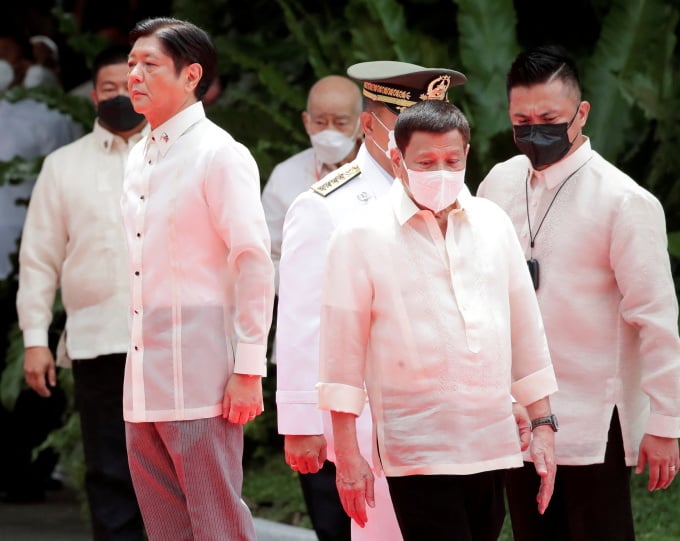
Philippine President Ferdinand Marcos Jr. (left) and former President Rodrigo Duterte in Manila in June 2022. Photo: Reuters
The feud between the two families began when the Marcos administration cut the secret budget of Vice President Sara Duterte. The decision came after Philippine media reported last year that Sara spent $2.2 million from her secret budget in the first 11 days of her term.
The Philippine Congress then launched an investigation and demanded explanations about the secret fund, which government agencies can spend without oversight. House Speaker Martin Romualdez, a close ally and cousin of Mr. Marcos, denied that he initiated the investigation for political purposes.
Tensions escalated when secret funds were cut from the 2024 budget of Ms. Sara's office, while President Marcos' funds were not affected.
Analysts say the rift goes beyond budgetary issues. Anthony Borja, an associate professor at De La Salle University in Manila, notes that the secret fund issue is just one of the growing tensions between the two families.
Cleve Argulles, a political scientist and managing director of Manila-based opinion research firm WR Numero, said the breakup was inevitable given the rocky relationship between the two families since they began forming an alliance ahead of the 2022 presidential election.
Mr. Marcos is the son of former President Ferdinand E. Marcos, who ruled the Philippines from 1965 to 1986. Ferdinand E. Marcos's imposition of martial law across the Philippines in 1972 led to a wave of popular anger, sparking the People Power Revolution that erupted in 1986, overthrowing his government.
At the age of 29, Marcos Jr. had to go into exile with his parents in Hawaii. After his father died in Hawaii in 1989, he and his family returned to the Philippines in 1991 and became wealthy and influential politicians in Ilocos Norte province, which is considered the "stronghold" of the Marcos family.
In 2021, Marcos announced his candidacy for president in a joint ticket with Sara. The Duterte family's support is considered an important factor in the incumbent President's smooth access to power.
After leaving office, Mr. Duterte retreated to Davao, the largest city on Mindanao island, where his family built power and ruled for two decades.
The feud between the two families widened when Mr. Duterte’s eldest son, Paolo, came under scrutiny for excessive government spending. Meanwhile, the Marcos administration launched the Bagong Pilipinas (New Philippines) campaign, highlighting the differences between the two families. The campaign was seen as a revival of his father’s New Society political movement.
Mr. Marcos has expressed support for efforts to amend the 1987 constitution, saying it would ease regulations for businesses and attract investment. However, Mr. Duterte has opposed the effort, accusing the Philippine president of using the constitutional amendment to maintain power.
President Marcos, after coming to power, also reversed Mr. Duterte's pro-China stance to strengthen relations with the US, allowing Washington more access to Philippine bases.
Another blow to the relationship came in November 2023, when Mr. Marcos said he was considering rejoining the Philippines to the International Criminal Court (ICC). Mr. Duterte withdrew the Philippines’ membership of the ICC in 2018, after the court’s prosecutor announced an investigation into his war on drugs, which has left thousands dead.
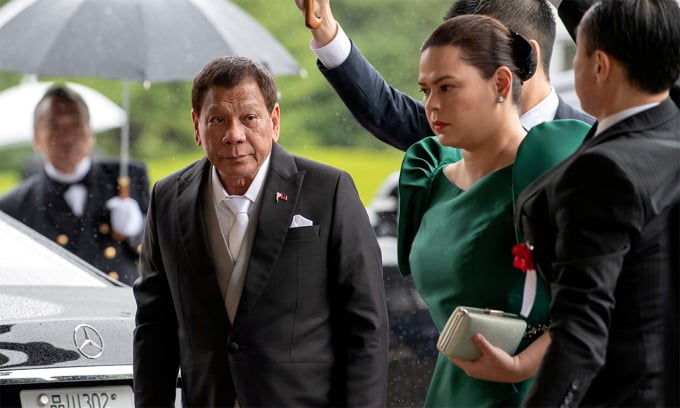
Mr. Rodrigo Duterte (front row, left) and daughter Sara Duterte-Carpio (blue dress) attend an event in Tokyo, Japan in October 2019. Photo: Reuters
Tensions have grown so high that at a recent event in Davao, Mr. Duterte launched a personal attack on President Marcos, describing him as a “drug addict,” even though the Philippine Drug Enforcement Agency said Mr. Marcos was never on the government’s “drug watch list.”
Sebastian Duterte, the youngest son of former President Duterte and mayor of Davao, also called on President Marcos to resign for "mistakes" such as his pro-US foreign policy which he saw as "endangering" the lives of ordinary Filipinos.
The Philippine president responded, saying that Duterte's accusations stemmed from his own use of fentanyl to control pain.
"I think it was fentanyl, the strongest painkiller you can buy. It's highly addictive and has serious side effects," President Marcos said, accusing Mr Duterte of using the drug for a "very long time".
Mr. Duterte once admitted using fentanyl as a painkiller when injured in a motorcycle accident in 2016, but said he stopped using it before becoming president.
Analysts say tensions with the Duterte clan could threaten Mr Marcos' ambitious plans to grow the economy, create jobs, overhaul infrastructure and strengthen the Philippine military.
"The breakdown of the two family alliances risks causing divisions within the military and reveals serious problems with governance and the stability of the country's politics," said Rivera.
The Philippines will hold midterm elections in 2025 to fill half of the Senate seats and elect lawmakers and local officials. If Marcos’s favored candidates lose, the Philippine president’s legislative agenda could be in jeopardy.
Many observers believe the coalition’s collapse could be linked to the 2028 presidential race, when Sara is expected to run. A 2023 Social Weather Stations poll found her to be the top choice for president in 2028.
"The conflict between the two families will become more public this year," said Ronald Llamas, a political analyst and former presidential adviser to the Philippines.
Thanh Tam (According to Straitimes Times, Nikkei Asia, Reuters )
Source link


![[Photo] Keep your warehouse safe in all situations](https://vphoto.vietnam.vn/thumb/1200x675/vietnam/resource/IMAGE/2025/10/1/3eb4eceafe68497989865e7faa4e4d0e)


![[Photo] President of the Cuban National Assembly visits President Ho Chi Minh's Mausoleum](https://vphoto.vietnam.vn/thumb/1200x675/vietnam/resource/IMAGE/2025/10/1/39f1142310fc4dae9e3de4fcc9ac2ed0)
![[Photo] Hanoi morning of October 1: Prolonged flooding, people wade to work](https://vphoto.vietnam.vn/thumb/1200x675/vietnam/resource/IMAGE/2025/10/1/189be28938e3493fa26b2938efa2059e)




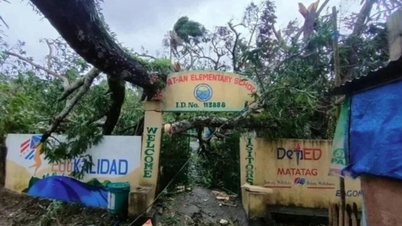

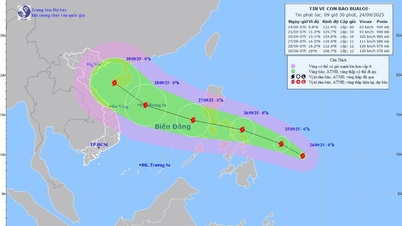













































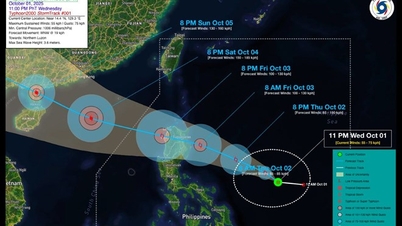
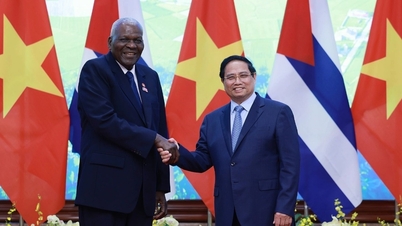













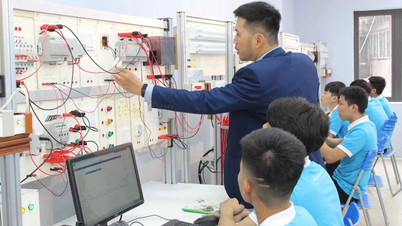

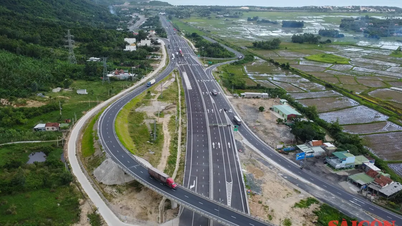

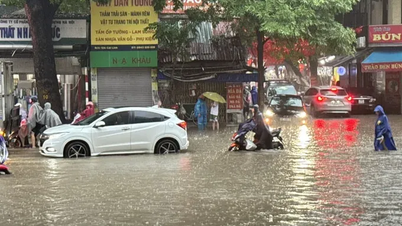
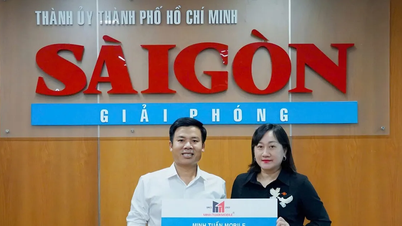
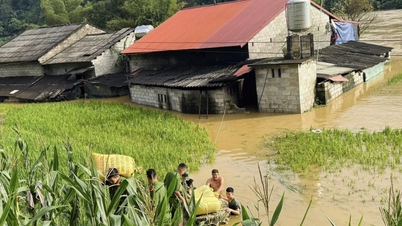















Comment (0)